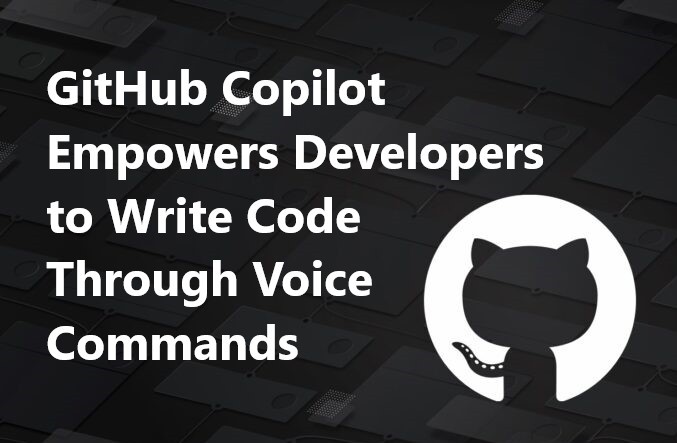GitHub Copilot Empowers Developers to Write Code Through Voice Commands

What is GitHub Copilot?
GitHub and OpenAI have created an AI-powered code completion and code suggestion tool called GitHub Copilot. It helps developers write code in supported code editors, like Visual Studio Code, by offering code suggestions, auto-completions, and contextual assistance.
GitHub Copilot is currently working on an upcoming functionality designed to enable developers to produce code via vocal input. While this feature is still in its preliminary stages of development, its prospects are poised to bring a transformative shift to the coding landscape.
With this forthcoming voice coding capability, developers will have the straightforward task of verbalizing their code through their microphone. Subsequently, Copilot will translate their spoken instructions into code directly within the integrated development environment (IDE). This innovation not only promises substantial time savings but also addresses concerns related to developer fatigue.
Although the voice coding feature is presently in its early developmental phase, its potential as a dynamic tool for developers is evident. It holds promise in enhancing accessibility for individuals with disabilities and, at the same time, stands to boost developer productivity.
Benefits of voice-based coding:
- Developers can accelerate and streamline their coding processes by verbally expressing their code, rather than manually typing it.
- Voice coding helps mitigate physical fatigue associated with extended typing sessions, promoting developer well-being.
- Voice coding fosters greater inclusivity in software development, catering to individuals with disabilities and supporting their engagement in coding endeavors.
- The ability to articulate code vocally enhances collaborative efforts among developers, enabling more effective communication and cooperation.
- Voice coding holds the potential to democratize coding, particularly benefiting those who face typing challenges, such as individuals with disabilities or those with repetitive strain injuries. It can also empower developers to code while on the move, such as during commutes or travel.
Drawbacks of voice coding:
- Voice recognition technology may not achieve flawless accuracy, introducing the risk of coding errors when using voice-based methods.
- Voice coding's effectiveness may diminish in noisy surroundings, where background sounds interfere with vocal commands.
- Voice coding necessitates developers to voice their code into a microphone, raising potential privacy apprehensions.
- Voice coding may not be the ideal choice for all coding tasks, particularly those involving intricate algorithms or requiring high precision. Additionally, collaborative coding settings with multiple developers working on the same codebase might pose challenges when employing voice coding techniques.
In general, voice coding seems exciting and could change how developers code. But, we should remember it might have some problems, like not always getting things right, issues with noise, and worries about privacy.
In the future, GitHub Copilot might let coders use their voice to write code. This could help developers to code faster, reduce tiredness, and be more inclusive. But there could be problems with accuracy and noise, and some might worry about privacy. So, while it's exciting, it might not work for all coding and situations.
